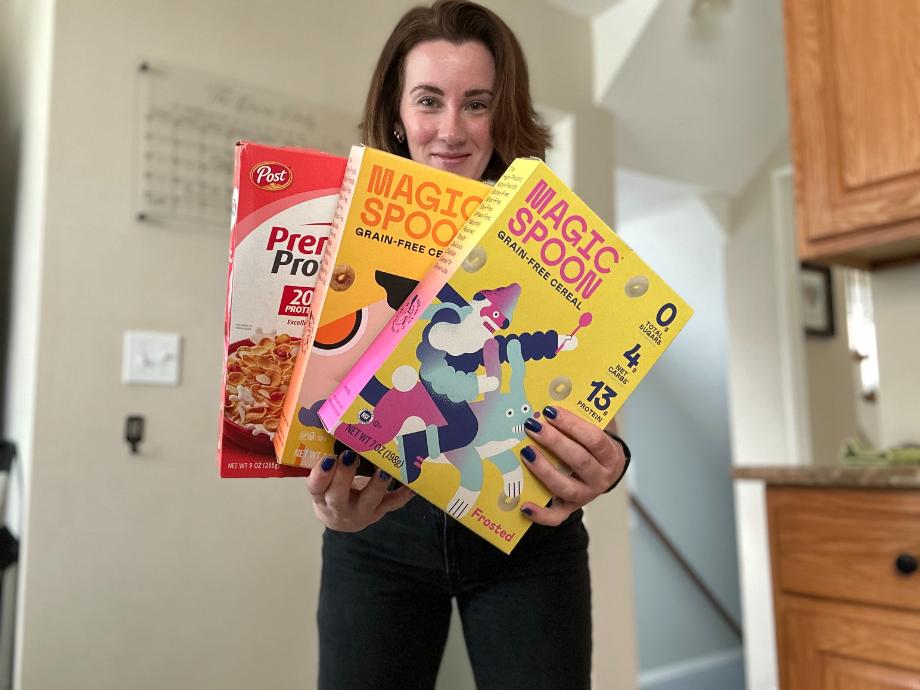We test and review fitness products based on an independent, multi-point methodology. If you use our links to purchase something, we may earn a commission. Read our disclosures.
If you’re on the hunt for the best protein cereal, it’s a fair bet that you are a cereal lover, but want better control of your blood sugar, appetite, or both. The problem with most cereals (and the American diet in general) is they are rarely high fiber or high protein, which results in a breakfast that not only leaves you still feeling hungry, but can cause you to crash mid-morning due to the rapid digestion.
This is why having a high-protein breakfast can be great. Not only can it be more satisfying, but it can help you meet your protein goals. On those days you’re just sick of even the best protein powder, having a bowl of crunchy, healthy cereal to help hit your numbers can be way more fulfilling. So, we tried several brands to see which ones are worth trying. Keep reading to see what our testers found out.
Medical disclaimer: This article is intended for educational and informational purposes only. It is not intended as a substitute for medical advice. For health advice, contact a licensed healthcare provider.
Best Protein Cereal
- Best Protein Cereal Overall: Magic Spoon
- Best Budget Protein Cereal: Premier Protein Cereal
- Best-Tasting Protein Cereal: Special K Protein Cereal
- Best Vegan Protein Cereal: Catalina Crunch Keto-Friendly Cereal
- Best Clean Protein Cereal: Ezekiel 4:9 Sprouted Crunchy Cereal
- Best Grocery Store Protein Cereal: Kashi GO
- Best Gluten-Free Protein Cereal: Three Wishes
Best Protein Cereal Overall: Magic Spoon
Good for: People who want to enjoy a bowl of a great-tasting protein cereal every now and then
Best Overall
Magic Spoon Cereal Variety Pack
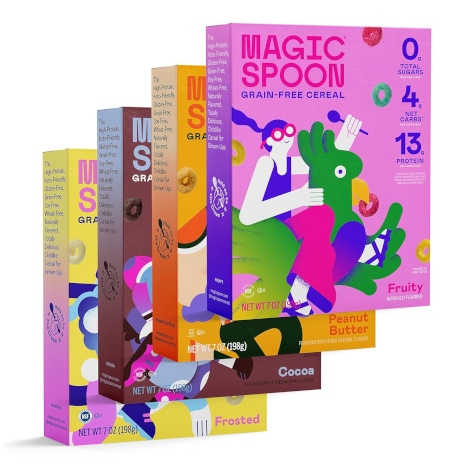
Product Highlights
- Grain-free breakfast cereal
- 13-14 grams of protein per serving depending on flavor
- Certified kosher and gluten free
- Variety pack contains 4 most popular flavors: Fruit, cocoa, frosted, and peanut butter
Pros & Cons
Pros
- 100% happiness guarantee when purchased from the Magicspoon website
- Keto friendly
- Subscribe and save 25%
- Able to build your own variety pack
- No artificial colors or sweeteners
Cons
- Unable to purchase 1 box, must purchase in packs of at least 4
- Customer reviews note an aftertaste
- Manufactured in a facility that processes wheat, soy, tree nuts, and sesame
- More expensive than traditional cereal
- Have to order online, not available in stores
Bottom Line
Magic Spoon is a grain-free, high-protein cereal available to purchase online. The cereals have 12-14 grams of protein depending on the flavor. Customer reviews were generally positive, and they liked the protein content and texture. Reviews did complain that there was an aftertaste.
As one of the more mainstream brands on this list, you’ve probably seen the colorful boxes belonging to Magic Spoon in your local grocery aisle. Well, we finally had it tested by Nicole Davis, GGR head of content and certified nutrition coach. She says, “The price is…shocking. $9.75 a box?” However, she does admit that the value is high: “It’s high in protein, has no sugar, and is pretty good all things considered, though,” she says. Either way, $9.75 is pretty outrageous for a box of cereal. So we still had to give it a 2 out of 5 rating for price.
RELATED: High-Protein, Low-Fat Foods
For taste, we gave this cereal a score of 3 out of 5. According to Nicole, the Fruity flavor “definitely tasted like Froot Loops, but then there’s also an aggressive aftertaste, which only gets more profound when you add milk.” She does go on to say, “If you eat them plain they taste pretty close to Froot Loops and even look like them!”
Nicole also tried the Cocoa flavor which she enjoyed more, but with one caveat: “It’s not as successful as passing for Cocoa Pebbles as the Fruity is for Froot Loops, but the flavor is more enjoyable and the aftertaste isn’t nearly as noticeable,” she says.
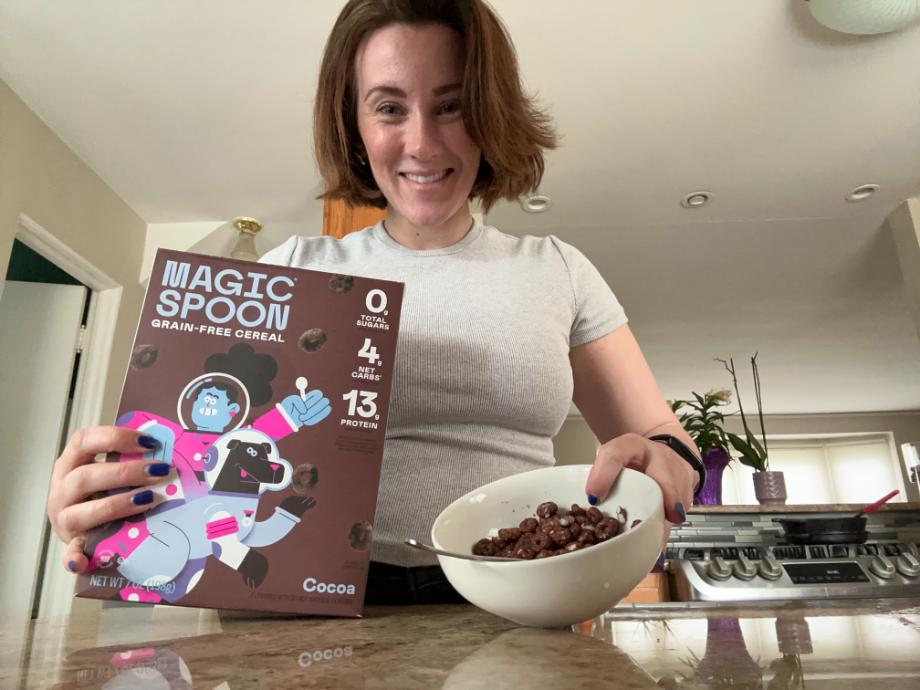
She also notes it’s a great flavor for those who don’t like overly sweet products. “Not as sweet as the Fruity, which is my preference. However, it’s not as pleasant to eat without milk.” As far as texture, Nicole remarks, “If I ate too much it would definitely hurt the roof of my mouth, so it feels like normal cereal!” Therefore, we gave it a 5-out-of-5 rating for texture.
Finally, we rated it a 5 out of 5 for formulation. Only 4 grams of net carbs makes it perfect for those on a keto diet who have been missing their cereal. However, having absolutely no sugar in a breakfast cereal is almost unheard of.
RELATED: What Is the Keto Diet?
To top it off, Magic Spoon is gluten-free, grain-free, and free of artificial sweeteners or flavors. Just know that the main source of protein is milk protein, so this isn’t a product that’s appropriate for those who are vegan or highly sensitive to lactose.
| Protein Per Serving | 13-14 g |
| Source of Protein | Milk Protein Blend |
| Flavors | Fruity, Peanut Butter, Cocoa, Cinnamon Roll, Frosted, Blueberry Muffin, Maple Waffle, Birthday Cake |
| Cost Per Serving | $1.95 |
Best Budget Protein Cereal: Premier Protein Cereal
Good for: People looking for a high-protein cereal that could double as a post-workout meal
Best Budget
Premier Protein Mixed Berry Almond Cereal
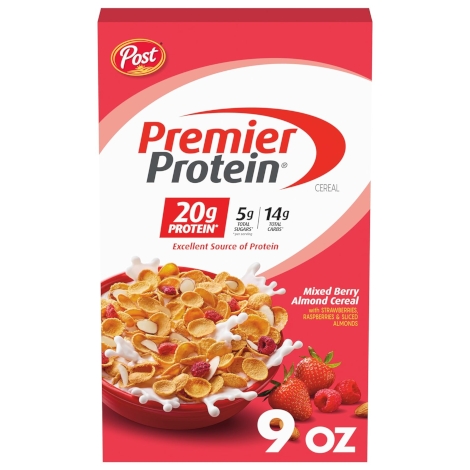
Product Highlights
- Plant-based high-protein cereal
- 20 g protein, 5 g total sugars, and 14 g carbs
- Available in 2 flavors: mixed almond berry and chocolate almond
Pros & Cons
Pros
- 20 grams of protein per serving—more than competitors
- Made with real strawberries and raspberries
- Customer reviews say cereal keeps them feeling full
- Price per serving is less than $1
Cons
- Only available in 2 flavors
- Some reviewers complained the cereal was too crunchy
- No flavor option without almonds
- May contain multiple allergens: milk, soy, tree nuts, and sesame seeds
Bottom Line
Premier Protein Mixed Berry Almond Cereal is a high-protein breakfast cereal. Each serving has 20 grams of protein, which is more than competitors which are generally around 10-15 grams per serving. Customer reviews were mixed on taste. Both flavors have nuts so if you’re allergic you’ll need to try a different option.
Tested by GGR Head of Content Nicole Davis, Premier Protein cereal has one of the highest protein contents out of the cereals on our list at 20 grams of plant protein per serving. That makes one serving of cereal the equivalent of the protein you’d get from one scoop of most brands of protein powder. Which is wild when you think about it!
We give a 5-out-of-5-star rating in price. At only $0.71 per serving, Premier Protein cereal can fit most budgets and is comparable to the price of conventional cereal, but with the latter you don’t get those sweet amino acids.
For taste, we gave it an almost perfect score of a 4.5 out of 5, but knocked it down a tad based on Nicole’s feedback about the aftertaste. “Is there an aftertaste? Sure, but it’s one I could live with. It gave me so much nostalgia for Special K Red Berry and is actually quite good—I’d get it again, especially for the protein content,” she says.
RELATED: High-Protein Foods for Weight Loss
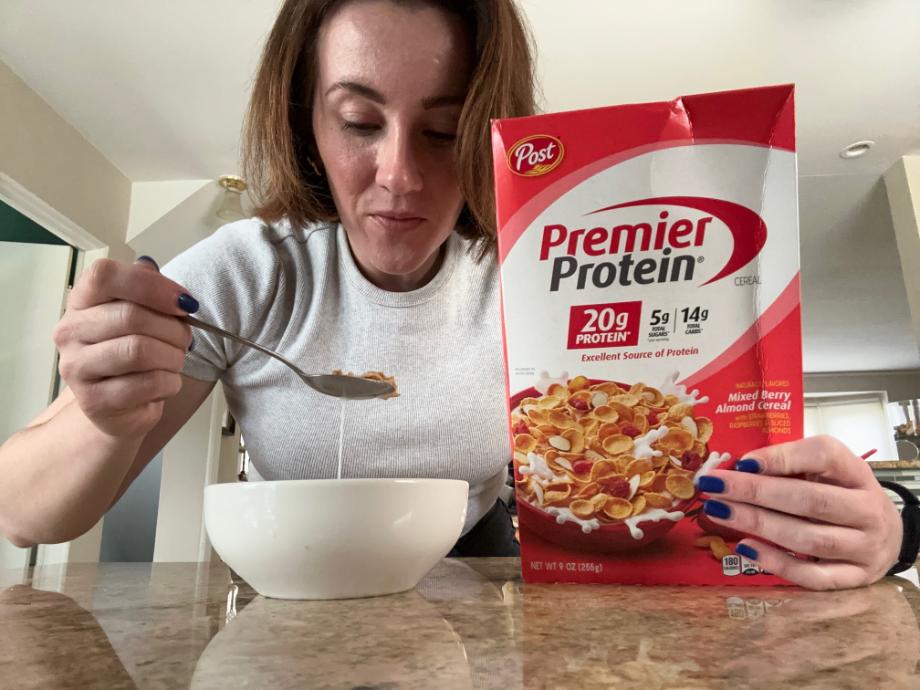
As far as texture, we gave it a 4.5 out of 5. Nicole says, “The flakes are different from the Special K ones, but not in a bad way.” Finally, we gave it a 4 out of 5 for formulation. “The macros are great for 14 grams of carbs and 20 grams of protein, but there are SO many artificial ingredients. Not the cereal for those looking for a clean product,” says Nicole.
It’s also pretty great that there’s real dried fruit and almonds in the cereal. The main source of protein also comes from wheat protein and pea protein concentrate, which are quality sources despite the budget-friendly price. The carb content also makes it an excellent post-workout snack. That said, there are only two flavors, so if you aren’t a fan of either you’re a bit out of luck.
| Protein Per Serving | 20 g |
| Source of Protein | Wheat Protein Isolate, Pea Protein Concentrate |
| Flavors | Mixed Berry Almond, Chocolate Almond |
| Cost Per Serving | $0.71 |
Best-Tasting Protein Cereal: Special K Protein Cereal
Good for: Those who don’t have high protein needs, but still want some extra protein with their cereal
Best-Tasting
Special K Protein Cereal Original Multigrain Touch of Cinnamon
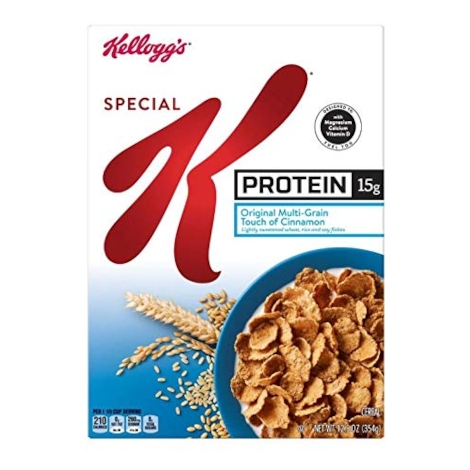
Product Highlights
- High-protein breakfast cereal
- 10 grams of protein and 5 grams of fiber per serving
- Available in 9 different flavors
Pros & Cons
Pros
- Cinnamon and chocolate almond flavors have 20 g of protein per serving
- More protein than traditional breakfast cereal
- Available in stores
Cons
- Reviews note Original Touch of Cinnamon flavor decreased protein per serving from 15 g to 10 g
- Large range of protein per serving depending on flavor (0-20 grams)
- Mixed reviews on taste
- More expensive than traditional cereal
Bottom Line
Special K Original Multigrain Touch of Cinnamon Breakfast cereal has 10 grams of protein and 5 grams of fiber per servings. There are also 9 other flavors but each one has different protein content. Customer reviews liked the taste. However, more recent reviews noted that the formula for Original changed and now the amount of protein per serving has decreased from 15 grams to 10 grams, while maintaining the same price.
When Kellogg’s Special K cereal first premiered, it was marketed heavily toward women as a weight loss tool. To subvert this stereotype, we had our guy Caine Wilkes, GGR senior staff writer, Olympic athlete, and strength coach, try it.
We gave it a 5 out of 5 for taste, hence its position on our list. According to Caine, “It’s pretty good! There’s zero protein flavor, but then again the cinnamon flavor is also muted, which would be great for those who don’t like sweet things.” He goes on to say, “It tastes more like a cereal that’s got some protein in it rather than a protein cereal and it’s got a great crunch.” So, we also gave it a 5 out of 5 for texture.
RELATED: Best Carbs for Bodybuilding

Speaking of which, let’s talk about the formulation, for which we gave it a 2-out-of-5 rating. “There is an excessive ratio of carbohydrates to protein,” Caine points out. And he’s not wrong. Even if you plan to have the cereal for some post-workout recovery, studies show that a 2:1 ratio of carbs to protein is the standard, but some studies go as high as a 3:1 ratio1 for optimal glycogen repletion.
At a whopping 44 grams of carbs per serving and only 10 grams of plant protein, Kellogg’s Special K Protein Cereal has a 4:1 ratio, which is just too much for most active individuals.
So, if your macros don’t allow for too many carbs, this isn’t a great way to get your protein in, especially since the 10 grams of protein is a sad amount. There are also 9 grams of sugar, which isn’t great, but there is 5 grams of fiber from wheat bran, which is actually high compared to most cereals.
RELATED: Best Pea Protein Powder
Finally, we scored it 3.5 out of 5 for price. Though $1.26 per serving isn’t terrible, it’s high compared to other choices on this list and you don’t really get much value if you’re paying over a dollar per serving for only 10 grams of plant-based protein.
| Protein Per Serving | 10 g |
| Source of Protein | Whole wheat, soy protein isolate |
| Flavors | Original Multi-Grain Touch of Cinnamon |
| Cost Per Serving | $1.26 |
Best Vegan Protein Cereal: Catalina Crunch
Good for: People on vegan and keto diets
Best Vegan
Catalina Crunch Cereal Variety Pack
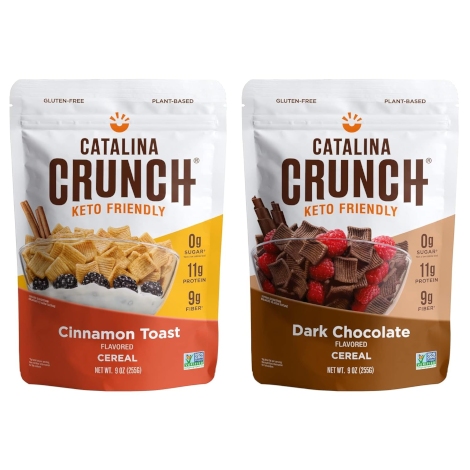
Product Highlights
- Vegan high-protein breakfast cereal
- Gluten free, keto friendly, non-GMO
- Zero sugar and no artificial colors or flavors
- Available in 9 flavors
Pros & Cons
Pros
- Vegan, gluten free, and keto friendly
- 0 sugar
- 9 flavors available
Cons
- More expensive than traditional cereals
- Mixed reviews on taste
- Customer reviews note an aftertaste
- Smaller serving size than competitors at ½ cup
Bottom Line
Catalina Crunch Cereal is a high-protein, keto-friendly alternative to traditional breakfast cereal. Customers like that it has 11 grams of protein and 0 grams of sugar. There were mixed reviews on the taste, including complaints of an aftertaste.
Catalina Crunch is insanely popular with keto dieters due to the low carb content and generous fiber content. What most people don’t realize is, outside of cereals like Raisin Bran, nearly all cereals are low in fiber.
Even what we consider to be the healthiest cereals like Cheerios and Life are surprisingly low in fiber, with Cheerios containing only 3 grams of fiber per serving and Life only 4 grams. Catalina Crunch, though, contains a whopping 9 grams of fiber from potato, corn, and chicory root. Chicory root also has the bonus of being a prebiotic fiber.
RELATED: Best Prebiotic Foods
Lauren Strong, GGR senior staff writer and certified personal trainer, tried out Catalina Crunch for us and gave it a 3 out of 5 for taste after trying the Cinnamon Toast and Maple Waffle flavors. “I was not prepared for how polarizing my opinions would be between the two flavors,” Lauren says. “Cinnamon Toast was enjoyable and tasted just like Cinnamon Toast Crunch.”
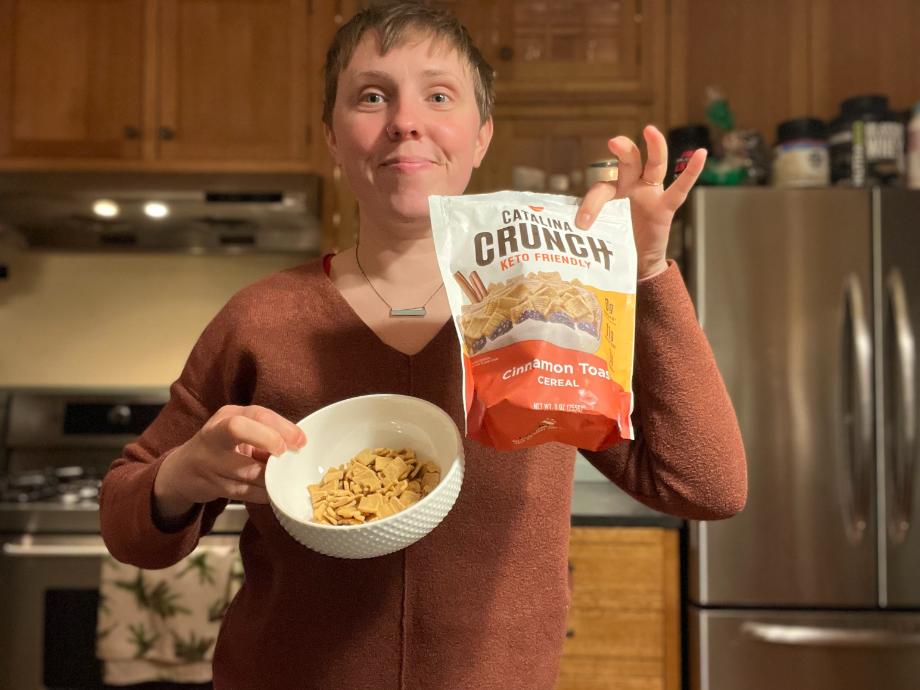
She doesn’t pull any punches with the second flavor, though. “The Maple Waffle was straight up trash. It just tasted like sugar alcohols—sort of like the aftertaste you get from low-sugar or sugar-free syrup,” she says.
We gave it a 3.5 out of 5 for texture. “The Maple Waffle has a weird film on the pieces which gave an off-texture that grossed me out. The Cinnamon Toast was better as the texture was similar to Cinnamon Toast Crunch, but make sure you eat this cereal fast. It gets soggy in milk very quickly,” Lauren says.
For formulation, we gave it a 3.5 out of 5. Catalina Crunch is vegan, grain-free, gluten-free, and has no sugar or artificial ingredients as it is sweetened with both stevia and monk fruit extract. That said, there are only 11 grams of protein, which isn’t terrible, but could be better for the price.
RELATED: A Registered Dietitian Breaks Down Pea Protein Benefits
And the price, by the way, is $1.52 per serving, which isn’t super cheap. That’s why we gave it a 3-out-of-5 rating for price. All in all, reviewers like the different flavors of this cereal and how it fits into many special diets quite easily. As a registered dietitian, I’m impressed by how thoughtfully it’s been formulated without adding anything artificial.
| Protein Per Serving | 11 g |
| Source of Protein | Pea Protein |
| Flavors | Cinnamon Toast, Triple Berry Blast, Dark Chocolate, Chocolate Peanut Butter, Fruity, Honey Graham, Maple Waffle, Mint Chocolate |
| Cost Per Serving | $1.60 |
Best Clean Protein Cereal: Ezekiel 4:9 Sprouted Crunchy Cereal
Good for: Individuals tired of ultra-processed cereal who want something super clean
Best Clean
Food For Life Organic Ezekiel 4:9 Sprouted Crunchy Cereal
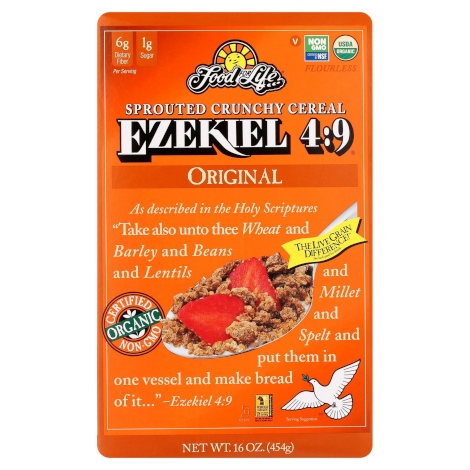
Product Highlights
- Sprouted grain cereal
- USDA organic, kosher, and non-glyphosate certified
- Vegan, non-GMO, and yeast free
- Available in 9 unique varieties
Pros & Cons
Pros
- Vegan, kosher, non-GMO, and USDA organic
- Available in 9 flavors
- Made in a Safe Quality Food (SQF) certified facility
- No artificial colors or flavors
- Customers noted the cereal was very filling
Cons
- Mixed reviews on taste
- Customers suggest adding something sweet to improve the taste
- More expensive than typical cereal
Bottom Line
Food for Life Ezekiel 4:9 Cereals are made with sprouted grains. Customers found the cereal to be very filling but there were mixed reviews on the taste. Multiple reviewers suggested adding something sweet like honey to improve the taste.
For those familiar with Ezekiel bread, you know the deal. For those who aren’t familiar, all you need to know is it’s a type of bread (or in this case, cereal) made from grains that have begun to sprout or germinate.
The benefit of eating grains that have sprouted is that the grains end up with a much higher vitamin content, a higher protein content, and the starch they produce is more digestible2.
When GGR Senior Staff Writer Lauren Strong tried Ezekiel 4:9 Sprouted Crunchy Cereal, she compared it to a brand called Grape Nuts, at the risk of aging herself.
Overall, we gave it a 4-out-of-5-star rating based on what Lauren reported after trying the Original, or plain, flavor. She says, “I liked it, but it’s not for everyone. It very much tastes like a health cereal, with the flavor of grain clusters with a little bit of sweet.” She also gave it a 4 out of 5 for texture, remarking, “It takes a while to get soggy, which is great! Overall it’s super crunchy.”
RELATED: Best Vegan Protein Bar
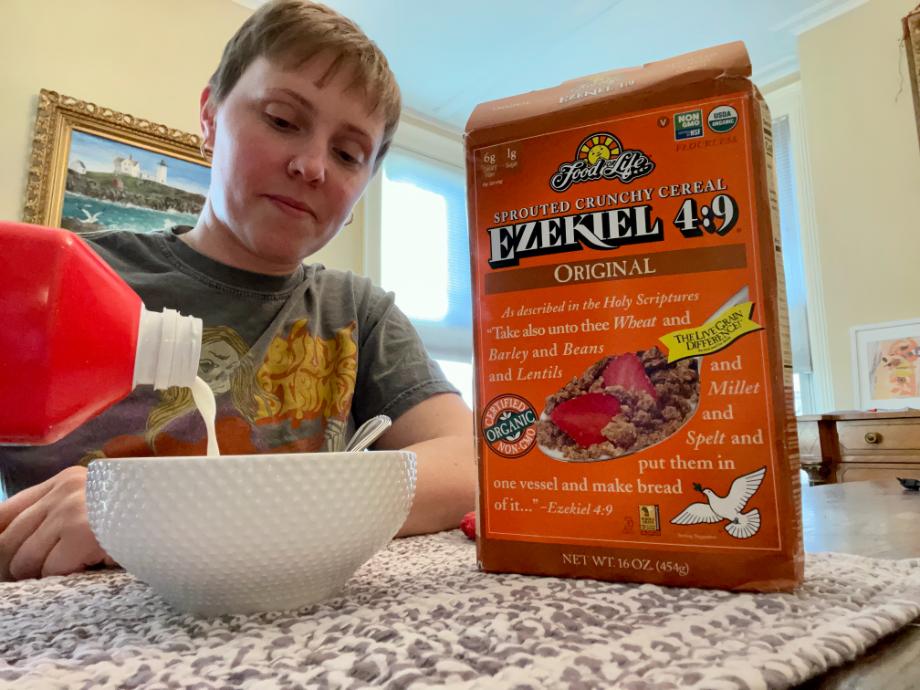
Be careful if you order online, though. “You can only get a refund if the box arrives damaged; nothing much you can do if you just don’t like it,” Lauren warns. “That said, you may end up taking them up on it, as my box arrived looking like someone was batting it around before it got to me.” So, we gave it a 3.5 out of 5 for customer service.
As for the price, Ezekiel Cereal is $1.07 per serving, so we gave it a 3.5 out of 5 for price, especially considering the formulation, which we gave a 2-out-of-5 rating for. “It’s a high carb to protein ratio,” Lauren says.
At only 8 grams of protein per serving and 35 grams of carbs, this kinda feels like a regular cereal that’s just a bit higher in protein. The carb content is so high because it’s made from five different types of grains along with lentils and soybeans for the plant-based protein source. No isolates! Which could be attractive to people who like their cereal as natural as possible.
| Protein Per Serving | 8 g |
| Source of Protein | Barley, Lentils, Millet, Soybeans, Spelt, Wheat |
| Flavors | Cinnamon Raisin, Golden Flax, Original |
| Cost Per Serving | $1.07 |
Best Grocery Store Protein Cereal: Kashi GO
Good for: People who want a protein cereal they can buy in-person rather than risk ordering online
Best Grocery Store
Kashi GO Original Protein Cereal
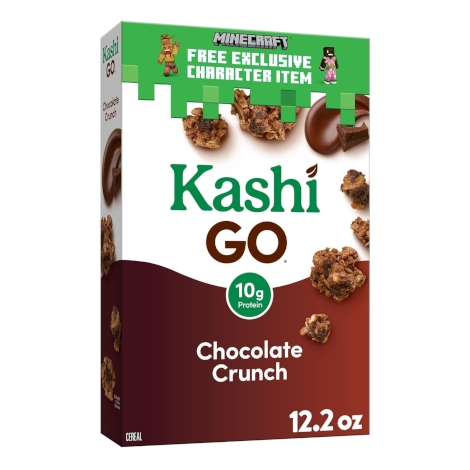
Product Highlights
- Plant-based high-protein breakfast cereal
- Non-GMO Project Verified and Kosher
- Available in 7 flavors
Pros & Cons
Pros
- More affordable than other protein cereals
- 7 different flavors
- NON-GMO Project verified
- Price per serving less than $1
Cons
- Uses soy protein
- Contains multiple allergens: soy, wheat, and sesame
- Amount of protein per serving varies by flavor (9-13 grams)
- Customers note having difficulty finding in stores
- Mixed reviews on taste
Bottom Line
Kashi GO Cereal Original is a plant-based protein cereal. It has 11 grams of protein per serving, which is on the lower end of the spectrum for protein cereals. However, it is more affordable than many other protein cereal options. There were mixed reviews on taste.
Using soy protein concentrate as their main source of protein, Kashi is a familiar name that has several flavors, but we recruited Matt Dustin, GGR staff writer and certified personal trainer, to try the Cinnamon Crisp for us.
RELATED: High Protein Meals
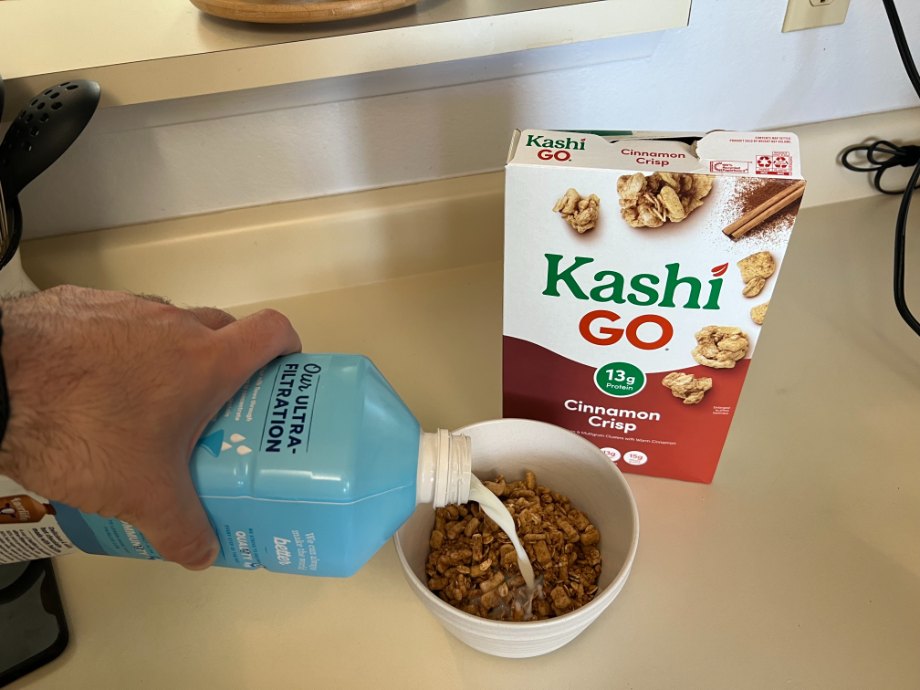
We gave it a 4 out of 5 for taste. “It’s not too sweet, but the cinnamon taste is also not super strong,” Matt reports. “That said, it wasn’t bad.” Texture was also rated a 4 out of 5. According to Matt, “there’s actually a lot of different textures you discover while eating it, but mostly crunchy, which is what I’m a fan of.”
The formulation only gets a 2 out of 5, though. There’s a high carb to protein ratio and a crazy 10 grams of added sugar. That means there’s more added sugar in this cereal than there is protein! That said, at least it’s affordable at only $0.83 per serving, so it does get a 5 out of 5 for price.
| Protein Per Serving | 12 g |
| Source of Protein | Soy protein concentrate |
| Flavors | Original, Toasted Berry Crisp, Chocolate Crunch, Peanut Butter Crunch, Cinnamon Crisp, Honey Almond Flax Crunch, Crunch |
| Cost Per Serving | $0.83 |
Best Gluten-Free Protein Cereal: Three Wishes
Good for: People who are gluten-sensitive and don’t want to eat overly processed cereal alternatives
Best Gluten-Free
Three Wishes Variety Pack Protein Breakfast Cereal
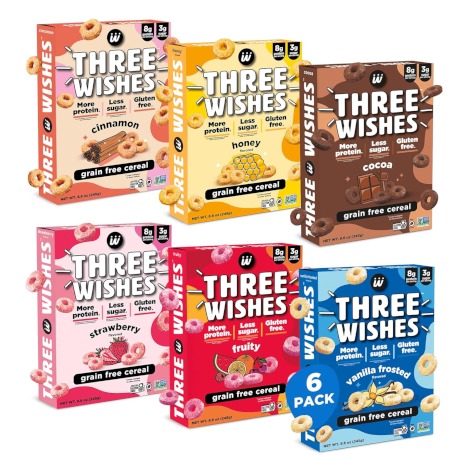
Product Highlights
- Vegan plant protein cereal
- 8 grams of protein per serving
- Gluten free, kosher, and Non-GMO
- No wheat, corn, rice, dairy, or oats
Pros & Cons
Pros
- Certified gluten free and non-GMO
- More affordable per serving than other protein cereals
- Can be found in stores like Target
- Available in 8 different flavors plus granola
- Offered in variety packs and single boxes
Cons
- Lower protein content than competitors at 8 g
- Mixed reviews on taste and texture
- More expensive than traditional cereals
Bottom Line
Three Wishes Protein Cereal is gluten free and has 8 grams of protein per serving in each flavor. This is less than many protein cereal competitors but their cereal is also cheaper than competitors. Customer reviews were very mixed on the taste and texture of the cereal.
Born from two parents who wanted to create the healthiest cereal they could after having their newborn son, Three Wishes is a family company started by the Wishingrads, and so named because, at the time of the company’s inception, there were three family members affectionately referred to as “The Wishes.” They also sell whole wheat granola.
Three Wishes was tested by GGR Senior Editor and Certified Nutrition Coach Erin Chancer, who got the flavor six-pack to see what she liked. “My favorite flavor was the Cinnamon,” Erin notes. “There’s a bit of an aftertaste, but nothing too unappealing. It reminds me of the malt-o-meal cereal I used to eat as a kid.” Not bad! Three Wishes got a 4-out-of-5 rating in taste from us.
RELATED: Best Protein Powder for Kids
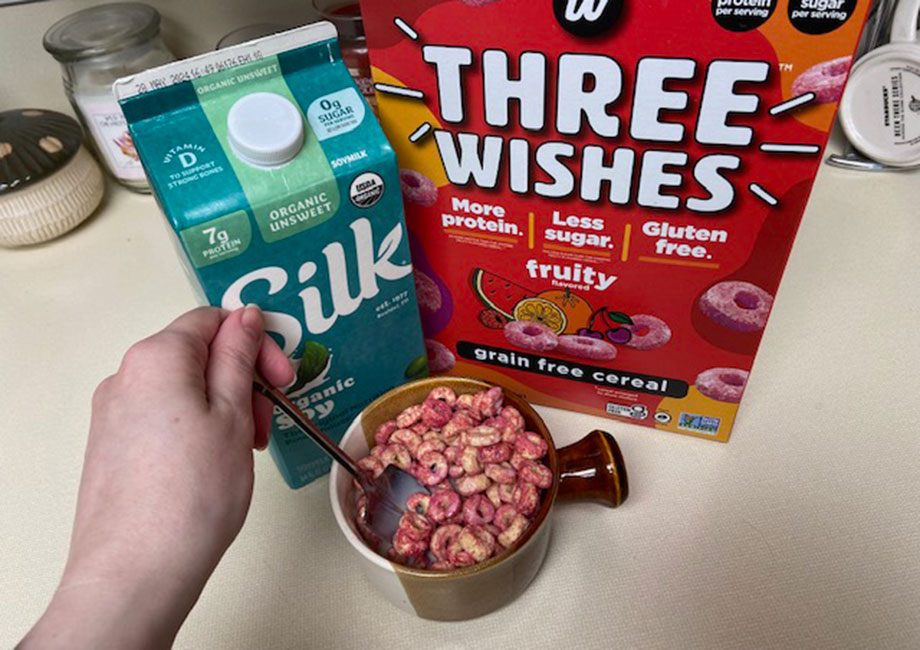
For texture, it also got a 4 out of 5. “Though it wasn’t as bad as other cereals, this stuff definitely cut up the roof of my mouth and some flavors tasted gritty,” Erin says. “I love the crunch it has, though.” At $1.10 per serving, we also gave it a 4 out of 5 for price as it’s not a bad price for a relatively wholesome cereal. You can buy Three Wishes on Amazon.
That said, the formulation gets a 2 out of 5. Though the ingredient list is short, the carb to protein ratio is high. There are also only 8 to 9 grams of protein depending on the flavor.
It is novel that Three Wishes uses chickpea protein and is sweetened with monk fruit so it’s low-sugar. “My husband loved it and I didn’t feel guilty eating it despite the great taste due to the low sugar,” Erin adds.
| Protein Per Serving | 8-9 g |
| Source of Protein | Chickpea, Pea Protein |
| Flavors | Chocolate-Covered Strawberry, Cinnamon, Cocoa, Frosted, Fruity, Honey, Horchata, Marshmallow, Neapolitan, Smores, Strawberry, Sugar Cookie, Unsweetened |
| Cost Per Serving | $1.10 |
Other Protein Cereal We Researched
- Ghost Protein Cereal: In our opinion, the flavor was nonexistent—as in, there was no flavor at all. While we love the Ghost whey protein flavors, we weren’t as enamored with their cereal.
- Wheaties Protein Cereal: The macros look good, but we haven’t tried it yet.
- Wholesome Provisions Protein Cereal: Another one we’ve not yet tried, but it has an impressive carb-to-protein ratio!
How We Picked and Tested the Best Protein Cereal
Our team of fitness professionals, coaches, and trainers didn’t just try these cereals for fun (though we do admit, it was a good time). We had a specific criteria in mind when we chose to put these brands on our list. These are the things we considered:
Protein and Carb Amount
The most obvious thing you should look for first is the protein content of your chosen cereal. This is especially true if you’re on a low calorie diet because, if you’re going to use your calories on a meal like cereal, it should be for a notable source of protein.
This is also tied to the carb count. Unless you’re on a low carb diet, it is good to have some carbs with your protein as carbohydrates are muscle sparing. This means that carbs indirectly help with muscle maintenance and growth as they can prevent muscle breakdown3, making them a great tool for recovery.
Cost
The bummer with specialty foods is that they are often way more costly than their conventional counterparts and protein cereal is no different. So, we wanted to provide a mixture of options that are high in price, but also quality, along with choices that can fit into almost any budget. This way, price doesn’t have to be a barrier to give high protein cereal a try.
RELATED: 9 Cheapest Meal Delivery Services
Special Diet-Friendly
We recognize that health and fitness enthusiasts may be following a specific diet, which is what makes these novelty food items so great—they can make a potentially forbidden food possible. Though most cereals are plant-based, many protein cereals are also keto-friendly, which is great for those going low-carb who miss their favorite breakfast treat.
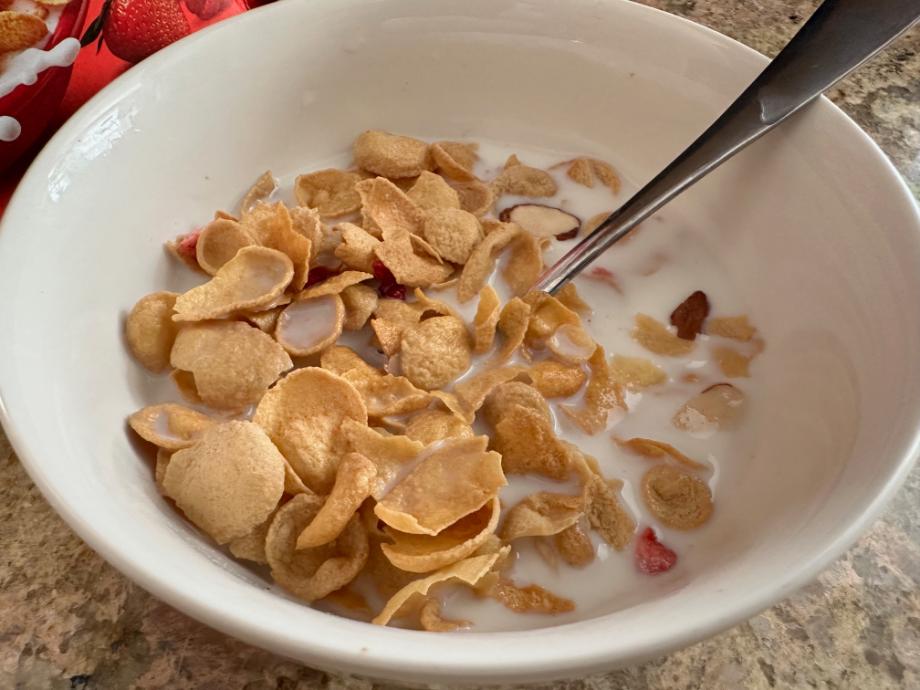
It’s also surprisingly common to find a protein cereal that’s also a no grain cereal, which is perfect for those who are gluten-free. That said, you can still find whole grain cereal that’s high in protein on this list, so there’s a little something for everyone.
Customer Reviews
Whether we’re talking about the best protein bars or the best protein cereal, we can’t ignore that these are food items that have been manipulated to have nutrients added, sugar removed, and flavors altered. Thus, it can result in products that are an acquired taste. So, we did take customer reviews into account before recommending them to be sure we weren’t reviewing something that is actually wildly derided.
Benefits of Protein Cereal
So, what’s the point of protein cereal? To be frank, breakfast cereals are notoriously low in protein, which can pose a problem for cereal lovers who also have to hit certain fitness and health goals. Here are some upsides to adding protein cereal to your routine in place of the classic stuff.
More Satiety Than Traditional Cereal
Yes, the topic of breakfast is controversial. However, in my experience as a registered dietitian, most people who struggle with weight loss can help themselves tremendously by eating breakfast consistently.
This is because skipping breakfast makes hunger hormones go haywire later in the day, which can cause feelings of deprivation, overeating, and cravings. It also says a lot about what type of breakfast you’re having, as a high protein breakfast is going to have more of an impact than a low protein one.
This fact has been reinforced by several studies. A study was done4 on groups of overweight females who were given a breakfast containing only 3 grams of protein, a breakfast containing 30 grams of protein, and a breakfast containing 39 grams of protein.
It was found that the women who had the high protein breakfast ate nearly 150 calories less during the day compared to the other groups, showing the impact of breakfast and protein in the morning on the feeling of fullness throughout the day.
Encourages Eating Breakfast
Speaking of breakfast, though eating a balanced one could help with weight management and health, having breakfast consistently is a major obstacle for most people, believe it or not. One reason breakfast is hard for people is they have a hard time getting up earlier to make it or they don’t have time to prepare one before they have to start work.
Another reason is that people don’t have an appetite for a traditional pancake and egg breakfast that early in the morning. No matter what’s stopping you, having a protein cereal on hand can help. For one, cereal is palatable. A sweet, crunchy treat in the morning may sound way more appetizing than a Denny’s dupe meal and it takes minimal time to prepare.
RELATED: Pre-Workout Breakfast
Supports a Healthy Metabolism
When people go on a cut, their protein needs go through the roof. There are several reasons for this, with the most obvious one being an increase in protein helps control hunger while you’re on a low calorie diet. More protein can also help you preserve muscle mass5 in a calorie deficit.
However, protein can also help increase your metabolism through TEF, or the thermic effect of food, which refers to how many calories your body burns through the act of digesting food. Studies show that the body burns 5-10% of calories in carbs through digestion and only up to 3% of calories from fat.
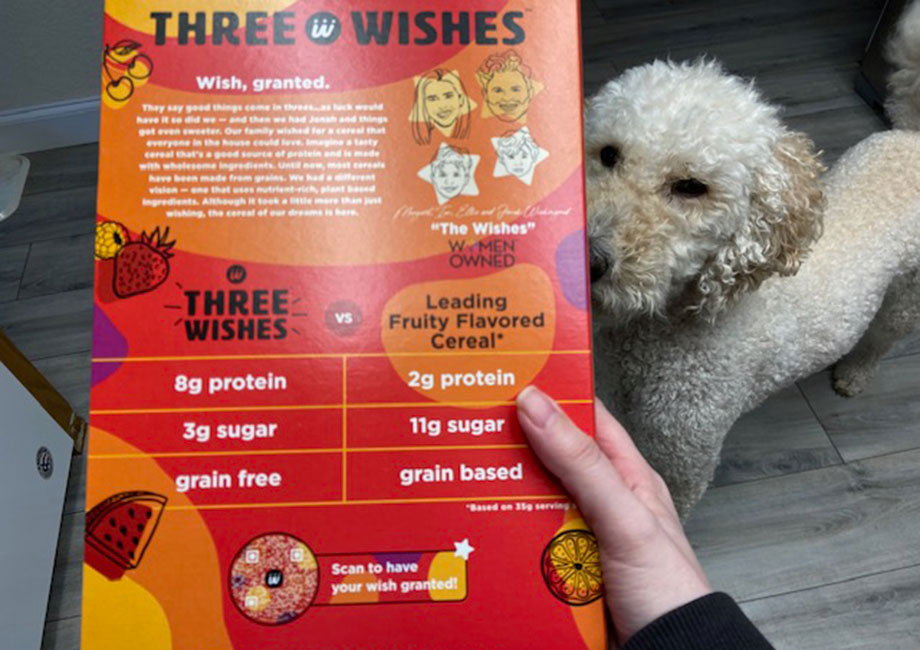
RELATED: Does Protein Make You Gain Weight?
When it comes to protein, however, the body can burn up to 30% of calories6, thus significantly increasing the amount of calories you burn at rest. Now, this doesn’t mean you’re going to burn a crazy amount of calories total or that the act of eating protein alone will have you dropping weight. However, it can help put your metabolism in a favorable position to make weight loss less difficult.
Helps With Muscle Maintenance and Hypertrophy
Most of us are aware of how incredibly important it is to keep protein intake high and consistent when we’re trying to gain muscle, maintain it, or experience optimal recovery. Multiple studies have demonstrated how dietary protein can help gain new muscle7 and maintain the lean mass we already have.
Thus, opting for high-protein versions of foods we are already eating can help optimize our body composition. Just know that the same study cited above notes that protein intake alone cannot stimulate hypertrophy; eating foods like high-quality animal proteins and protein cereal along with a solid weight-training program is the best way to maintain and gain more muscle mass.
RELATED: Best Protein Pasta
Dosing and Interactions
Like other protein supplements, protein cereal is safe to consume in moderation. Protein cereal is not known to cause adverse side effects, and since it is a food item, it is regulated by the FDA, which gives you more assurance that it is safe for consumption.
However, as you may have noticed, many of these cereals are formulated to remove the grains and grams of sugar that you’d see more of in conventional breakfast cereal. So, this may involve more processing and addition of unfamiliar ingredients such as sugar alcohols and artificial sweeteners.
A large number of gastrointestinal side effects have been reported as a result of consuming sugar alcohols in excess. These effects include abdominal pain, bloating, and flatulence due to the fact that they aren’t completely absorbed by the small intestine8. Though artificial sweeteners don’t often produce GI side effects, they can cause discomfort in those with bowel disorders.
Third-Party Testing
Testing by a third party for sport is a method that is usually reserved for fitness and workout supplements, not food products. A third-party test for supplements is a voluntary measure designed to provide consumers with assurance since supplements are not regulated by the FDA.
RELATED: Best Protein Chips
Due to the fact that cereal is a food product, third-party testing is not necessary, given that food for sale must meet the FDA’s strict safety regulations. So, why would you see the label of NSF on a food product like Magic Spoon Cereal?
NSF for Sport and NSF Certified Products are two separate things. Sports nutrition supplements tested by the NSF for Sport program are testing specifically for supplements that contain potentially harmful ingredients or banned substances such as performance enhancers. Though NSF for Sport recently broadened its scope to cosmetic and personal care products, it is not involved with food.
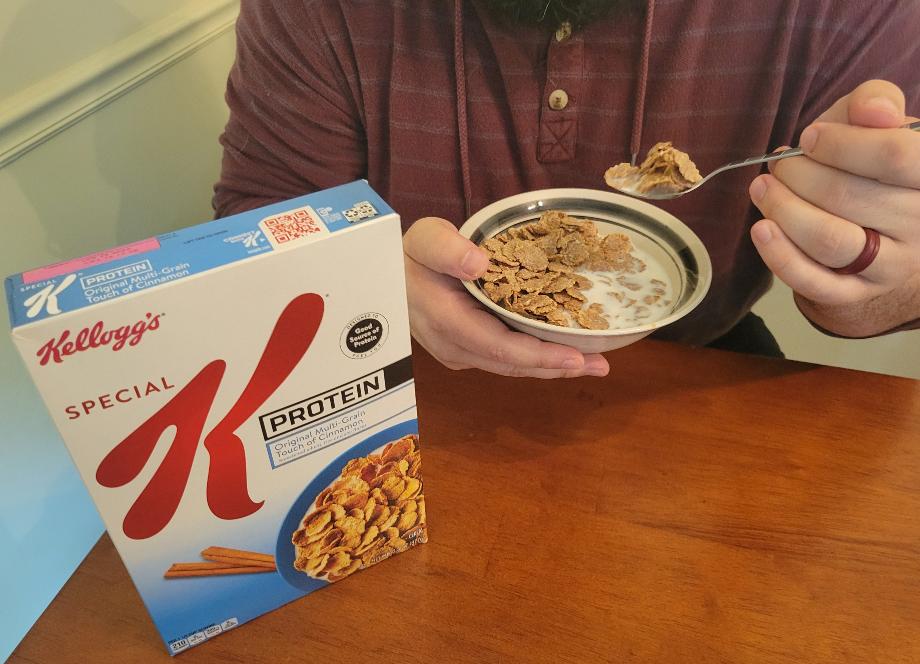
The most recognized food safety standards organization is NSF International, which is the umbrella under which NSF for Sport lives. NSF International certifies the facilities in which certain foods are made and certifies the facility for having safe food handling practices, especially if they are an allergen-friendly food.
Using Magic Spoon as an example, it is NSF Certified for being a gluten-free product that’s safe for gluten-sensitive consumers, but it is not NSF Certified for Sport.
Buying Guide: What to Look for in Protein Cereal
As people slowly start to realize the benefits of having protein in every meal, the prevalence of protein cereal isn’t going away anytime soon. That said, you should know what to look for if you go out shopping for one on your own.
Carb-to-Protein Ratio
It’s long been the rule of thumb that a 2:1 carb to protein ratio is optimal for recovery. Though it’s still somewhat of a controversial recommendation, some studies have shown that having 2 grams of carbs for every gram of protein for your post-workout recovery is optimal for mitigating muscle loss, supporting gains in lean mass, and optimizing glycogen repletion9.
RELATED: Best Ratio for BCAAs
So, it depends on when you consume your high protein cereal and what your goals are, but these details will have a heavy bearing on your cereal selection. In the most extreme example, according to the study above, some endurance athletes may need a 3:1 or even a 4:1 ratio for proper glycogen and protein metabolism.
For most people, though, a ratio this high can be unnecessary and make weight management more difficult. For example, having carbohydrates in excess of your needs can mean there aren’t enough macros left for healthy, high fiber carbs like fruits and veggies or whole grain products. So, choose the cereal with higher ratios carefully to see if they are appropriate for your needs.
Diet Preferences
For those who follow special diets, you already know that the ingredient list on the label is your best friend. If you’re low carb, try to find a protein cereal that’s got a good balance of low net carbs, high fiber, and great taste, as it can be harder than you think to find all three!
Vegans and those with lactose intolerance should also find a healthy cereal that uses plant protein rather than milk protein. Also, many brands on this list are no gluten or grain cereal, which works out great for those who are intolerant or allergic to grains.
RELATED: Plant Protein vs Animal Protein
Familiar Ingredients
Most American breakfast cereals and granola don’t contain a significant amount of protein. Many are also criticized for being ultra-processed and studies have shown that frequent consumption of ultra-processed food increases risk for heart disease, cancer, and early death10.
So, though it may be common to find some extra ingredients here and there when you have a product like protein cereal, bars, or chips, you want to keep the artificial and unfamiliar stuff to a minimum if protein cereal is going to make a regular appearance in your diet.
Experts Who Contributed to This Article
FAQs About Protein Cereal
What cereal is highest in protein?
So far, the cereal with the highest protein content we’ve tried was Premier Protein Cereal with 20 grams of protein per serving.
What are the benefits of high-protein cereal?
A high-protein cereal can help supply whole grains that satiate, promote better blood sugar control, and help those on low-carb diets enjoy cereal while minimizing the consumption of net carbs.
Can I eat cereal on a high-protein diet?
You can eat cereal on a high-protein diet. Just make sure that the additional carbohydrates don’t displace protein in your diet so much that you can’t meet your needs.
These statements have not been evaluated by the Food and Drug Administration. This product is not intended to diagnose, treat, cure, or prevent any diseases.
References
- Ivy JL, Goforth HW Jr, Damon BM, McCauley TR, Parsons EC, Price TB. Early postexercise muscle glycogen recovery is enhanced with a carbohydrate-protein supplement. J Appl Physiol (1985). 2002;93(4):1337-1344. doi:10.1152/japplphysiol.00394.2002
- Ikram A, Saeed F, Afzaal M, et al. Nutritional and end-use perspectives of sprouted grains: A comprehensive review. Food Sci Nutr. 2021;9(8):4617-4628. Published 2021 Jun 23. doi:10.1002/fsn3.2408
- Henselmans M, Bjørnsen T, Hedderman R, Vårvik FT. The Effect of Carbohydrate Intake on Strength and Resistance Training Performance: A Systematic Review. Nutrients. 2022;14(4):856. Published 2022 Feb 18. doi:10.3390/nu14040856
- Rains TM, Leidy HJ, Sanoshy KD, Lawless AL, Maki KC. A randomized, controlled, crossover trial to assess the acute appetitive and metabolic effects of sausage and egg-based convenience breakfast meals in overweight premenopausal women. Nutr J. 2015;14:17. Published 2015 Feb 10. doi:10.1186/s12937-015-0002-7
- Longland TM, Oikawa SY, Mitchell CJ, Devries MC, Phillips SM. Higher compared with lower dietary protein during an energy deficit combined with intense exercise promotes greater lean mass gain and fat mass loss: a randomized trial. Am J Clin Nutr. 2016;103(3):738-746. doi:10.3945/ajcn.115.119339
- Westerterp KR. Diet induced thermogenesis. Nutr Metab (Lond). 2004;1(1):5. Published 2004 Aug 18. doi:10.1186/1743-7075-1-5
- Stokes T, Hector AJ, Morton RW, McGlory C, Phillips SM. Recent Perspectives Regarding the Role of Dietary Protein for the Promotion of Muscle Hypertrophy with Resistance Exercise Training. Nutrients. 2018;10(2):180. Published 2018 Feb 7. doi:10.3390/nu10020180
- Ruiz-Ojeda FJ, Plaza-Díaz J, Sáez-Lara MJ, Gil A. Effects of Sweeteners on the Gut Microbiota: A Review of Experimental Studies and Clinical Trials [published correction appears in Adv Nutr. 2020 Mar 1;11(2):468]. Adv Nutr. 2019;10(suppl_1):S31-S48. doi:10.1093/advances/nmy037
- Kerksick C, Harvey T, Stout J, et al. International Society of Sports Nutrition position stand: nutrient timing [published correction appears in J Int Soc Sports Nutr. 2008;5:18]. J Int Soc Sports Nutr. 2008;5:17. Published 2008 Oct 3. doi:10.1186/1550-2783-5-17
- Cordova R, Viallon V, Fontvieille E, et al. Consumption of ultra-processed foods and risk of multimorbidity of cancer and cardiometabolic diseases: a multinational cohort study. Lancet Reg Health Eur. 2023;35:100771. Published 2023 Nov 14. doi:10.1016/j.lanepe.2023.100771
Further reading

After researching over 50 power bars and legitimately testing 11 of them, we've determined that the Rogue Ohio Power Bar is the best power bar for most people. Considering the price, tensile strength, warranty, performance, knurling, availability, general consensus, and durability, the Rogue Ohio Power Bar offers the best quality for the price of any powerlifting barbell currently on the market. Read more

If you’re on the hunt for the best protein cereal, it’s a fair bet that you are a cereal lover, but want better control of your blood sugar, appetite, or both. The problem with most cereals (and the American diet in general) is they are rarely high fiber or high protein, which results in a breakfast that not only leaves you still feeling hungry, but can cause you to crash mid-morning due to the rapid digestion. » Read more about: Best Protein Cereal (2025): Eat Your Amino Acids for Breakfast » Read more

In this Pure Protein powder review, we’ll highlight our experience testing this protein concentrate over the course of several weeks. Read more

In this NordicTrack C 700 treadmill review, I’ll provide an in-depth, research-based review that encompasses all you’ll need to know about this possible hidden gem. Read more

